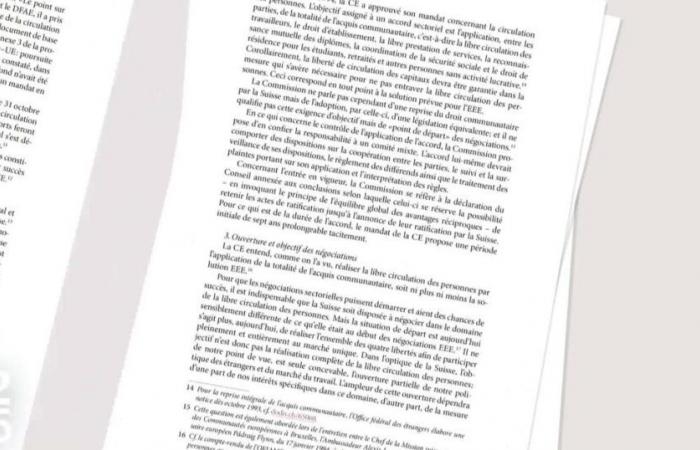
Nearly 1,700 Swiss diplomatic documents from 1994 are now accessible to the public. This annual declassification lifts the veil on a pivotal year for relations between Switzerland and the European Union… a bit like 2024.
The year “1994 is crucial for resolving Switzerland’s relations with the European Union”, explains in Forum Sacha Zala, director of the Dodis research center, specializing in the history of Switzerland’s international relations.
That year, two years after the people’s refusal of Switzerland’s membership in the European Economic Area (EEA), the Federal Council sought solutions to establish bilateral agreements with the EU. But the government must deal with other popular blockages, in particular the acceptance of the Alps initiative which wants to limit transit traffic.
“These negative votes undermine the efforts of the Federal Council,” underlines Sacha Zala. Brussels, nervous, also marks a pause in the negotiations.
The Federal Council faces a crisis of confidence
Faced with these setbacks, the Federal Council is adopting a cautious strategy, without calling direct democracy into question. “There is a crisis of confidence and the Federal Council discusses this crisis on several occasions,” reveals Sacha Zala.
The solution? Anchor foreign policy more in domestic policy, which will have the consequence of giving a fairly restrictive mandate for the negotiations of bilateral agreements.
A surprising document also emerges from the archives: “In the spring, the Federal Council diagnosed a crisis in its internal dynamics and proposed an emergency meeting,” indicates the researcher. This “retreat” will take place in December 1994, in the form of a “conclave”.
>> See also the subject of 12:45 p.m.:
Striking parallels with 2024
The similarities between 1994 and 2024 are interesting, underlines Sacha Zala. “There are a lot of parallels with similar dynamics,” confirms Sacha Zala.
The free movement of people perfectly illustrates this parallel. “The Federal Council knows that this is a question of principle for the EU, but that it will be difficult to put through a popular vote,” explains the researcher, who recalls that the bilateral agreements discussed in 1994 only came to fruition. in 1999. “We may have to wait another five years to have a new package of bilateral agreements,” he concludes.
Comments collected by Valentin Emery
Web adaptation: Victorian Kissling
Swiss





